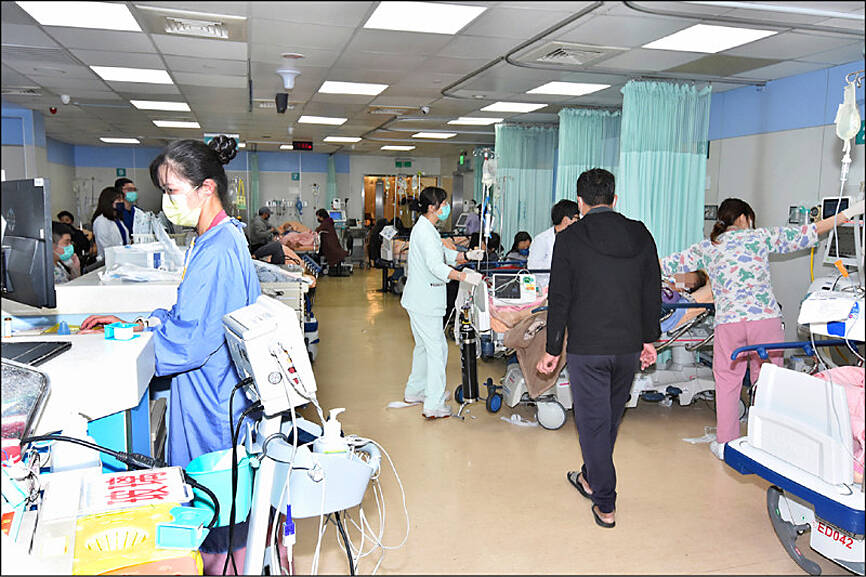The government next year is to launch a Cabinet-level task force to fight global pandemics, the spread of superbugs and other emerging threats to public health, the Ministry of Health and Welfare said yesterday.
Minister Without Portfolio Chen Shih-chung (陳時中), who headed the ministry during the COVID-19 pandemic, has been tapped to run the task force, a ministry spokesperson said at the Cabinet meeting in Taipei.
The ministry is to outline the task force’s organization, authority and functions in the “national integrated epidemic prevention plan” scheduled for release in November for the Executive Yuan’s approval, they said.

Photo: Taipei Times
The task force is intended to improve horizontal communication and multi-agency cooperation in public health matters to address novel health threats stemming from global warming, ecosystem disruption and globalization, they said.
The organization’s mandate is to mitigate the dangers posed by new or re-emerging zoonotic diseases, the regional or global spread of infectious diseases, diseases that have been neglected by researchers, regulatory gaps in food safety standards and superbug outbreaks, they said.
The task force would comprise of government officials across the MOHW, Ministry of Agriculture, Ministry of the Interior and academics from related disciplines, they said.
Premier Cho Jung-tai (卓榮泰) approved the proposal at the Cabinet meeting after emphasizing the importance of coordination between central and local governments.
In related news, the health ministry has since yesterday increased medical appointment slots for gastroenterological and flu-like diseases, after a surge in cases caused overflows at the nation’s 21 government-owned general hospitals.
The extra appointment slots would be made available day and night, said Wang Yu-wei (王裕煒), deputy chief executive officer at the Hospital and Social Welfare Administration Commission.
The ministry aims to add 924 slots per month, but hospitals may decide to assign more doctors or order doctors to work more cases according to staffing levels and local conditions, he said.
People with gastroenterological or flu-like symptoms are to be directed to a relevant medical department or local clinics when appropriate to avoid overcrowding emergency rooms, Wang said.
The measure would remain in effect until the number of cases fall back to normal levels, Wang said.
People displaying moderate symptoms of the flu or stomach flu are encouraged to report to the appropriate hospital department or a local clinic to allow emergency rooms to focus on life-threatening conditions, he said.
Deputy Minister of Health and Welfare Chou Jih-haw (周志浩) said that government data suggest the crisis of overcrowded emergency rooms appears to be winding down.
Hospitals are reporting fewer people on waiting lists for beds and in emergency room queues, although the number is still significantly higher than normal, he said.
The health ministry is dealing with the situation by focusing on improving the flexibility of bed distribution, horizontal communication between hospitals and educating the public about the hierarchy of medical needs, Chou said.
People are urged to wash their hands and wear masks in public to avoid getting sick, and seek medical attention at neighborhood clinics if their condition is not severe, he said.
Additional reporting by CNA

The Coast Guard Administration (CGA) yesterday said it had deployed patrol vessels to expel a China Coast Guard ship and a Chinese fishing boat near Pratas Island (Dongsha Island, 東沙群島) in the South China Sea. The China Coast Guard vessel was 28 nautical miles (52km) northeast of Pratas at 6:15am on Thursday, approaching the island’s restricted waters, which extend 24 nautical miles from its shoreline, the CGA’s Dongsha-Nansha Branch said in a statement. The Tainan, a 2,000-tonne cutter, was deployed by the CGA to shadow the Chinese ship, which left the area at 2:39pm on Friday, the statement said. At 6:31pm on Friday,

The Chinese People’s Liberation Army Navy’s (PLAN) third aircraft carrier, the Fujian, would pose a steep challenge to Taiwan’s ability to defend itself against a full-scale invasion, a defense expert said yesterday. Institute of National Defense and Security Research analyst Chieh Chung (揭仲) made the comment hours after the PLAN confirmed the carrier recently passed through the Taiwan Strait to conduct “scientific research tests and training missions” in the South China Sea. China has two carriers in operation — the Liaoning and the Shandong — with the Fujian undergoing sea trials. Although the PLAN needs time to train the Fujian’s air wing and

Taiwanese celebrities Hank Chen (陳漢典) and Lulu Huang (黃路梓茵) announced yesterday that they are planning to marry. Huang announced and posted photos of their engagement to her social media pages yesterday morning, joking that the pair were not just doing marketing for a new show, but “really getting married.” “We’ve decided to spend all of our future happy and hilarious moments together,” she wrote. The announcement, which was later confirmed by the talent agency they share, appeared to come as a surprise even to those around them, with veteran TV host Jacky Wu (吳宗憲) saying he was “totally taken aback” by the news. Huang,

The American Institute in Taiwan (AIT) put Taiwan in danger, Ma Ying-jeou Foundation director Hsiao Hsu-tsen (蕭旭岑) said yesterday, hours after the de facto US embassy said that Beijing had misinterpreted World War II-era documents to isolate Taiwan. The AIT’s comments harmed the Republic of China’s (ROC) national interests and contradicted a part of the “six assurances” stipulating that the US would not change its official position on Taiwan’s sovereignty, Hsiao said. The “six assurances,” which were given by then-US president Ronald Reagan to Taiwan in 1982, say that Washington would not set a date for ending arm sales to Taiwan, consult